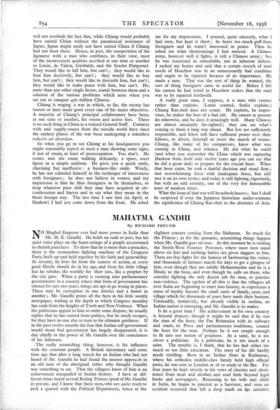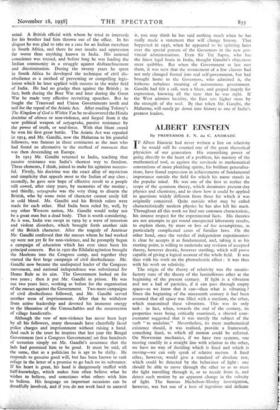MAHATMA GANDHI
By RICHARD FREUND
NO Moghul Emperor ever had more power in India than Mr. M. K. Gandhi. He holds no rank or post, but his quiet voice plays on the heart-strings of a people accustomed to cherish preachers. To show that he is more than a preacher, there is the tremendous fighting machine of the Congress Party, built up and held together by his faith and generalship. At seventy, he lives far from the centres of action, as every good Hindu should do in his age, and from his little village but he rebukes the worldly for their sins, like a prophet by the city gate. When a party is running nine parliamentary governments in a country where that form of government has existed for just two years, things are apt to go wrong in places. There may be corruption in one district and a brawl in another ; Mr. Gandhi prints all the facts in his little weekly newspaper, wailing at the depth to which Congress morality has sunk from the heights of Truth and Non-Violence. When the politicians appeal to him to settle some dispute, he usually replies that he has retired from politics, but he rarely escapes, for they have no one else to turn to for ultimate guidance. If in the past twelve months the fear that Indian self-government would mean bad government has largely disappeared,' it is due chiefly to the power of Mr. Gandhi over the consciences of his followers.
The really astonishing thing, however, is his influence with the common people. A British missionary said some time ago that after a long search for an Indian who had not heard of Mr. Gandhi he had found the nearest approach in an old man of the aboriginal tribes who thought Gandhi was something to eat. That the villagers know of him is an achievement unequalled in Indian history. I have at dif- ferent times heard several Ruling Princes speak of Mr. Gandhi in private, and I know that these men, who are quite ready to pick a quarrel with the Political Department, Wince at the slightest censure coming from the Mahatma. So much for the Princes ; as for the peasants, astonishing things happen when Mr. Gandhi goes on tour. At this moment he is visiting the North-West Frontier Province, where most men stand above six feet and teething babies are given daggers to bite. There are free fights for the honour of harbouring the visitor, and thousands of farmers march for days to get a glimpse of him, even though they are solidly Mohammedan and he is a Hindu to the bone, and even though he calls on them, who consider fighting the only decent job for men, to practise non-violence. The upshot of all this is that the villagers all over India are beginning to enter into history, to experience a sense of loyalty beyond the small units of family, caste, and village which for thousands of years have made their horizon. Unsteadily, tentatively, but already visible in outline, an Indian nation is emerging, and Mr. Gandhi is its maker.
Is he a great man ? His achievement in his own country is beyond dispute, though it might be said that if he was the man of the hour, the Pax Britannica with its railways and roads, its Press and parliamentary traditions, created the hour for the man. Perhaps he is not simple enough to fit into our notion of greatness. As a saint, he is too clever a politician. As a politician, he is too much of a saint. The trouble is, I think, that he has had either too much or too little education. The story of his life hardly needs 'retelling. Born in an Indian State in Kathiawar, where his orthodox middle-class family held high official posts, he was sent to London at 18 to study at the Bar. For four years he kept- strictly to his vows of chastity and absti- nence from meat and alcohol, and read little ' beyond legal books and newspapers. Returning to his wife and child in India, he began to practise as a barrister, and soon an accident occurred that -left a deep mark on his.sensitive mind. A British official with whom he tried to intercede for his brother had him thrown out of the office. In his disgust he was glad to take on a case for an Indian merchant in South Africa, and there he met insults and oppression far worse than anything known in India. His national conscience was roused, and before long he was leading the Indian community in a struggle against disfranchisement and discrimination. During the twenty years he spent in South Africa he developed the technique of civil dis- obedience as a method of preventing or compelling legis- lation which he later applied with success in the wider field of India. He had no grudge then against the British ; in fact, both during the Boer War and later during the Great War he made very effective recruiting speeches. But he fought the Transvaal and Union Governments tooth and nail for the repeal of the Asiatic Act. After reading Tolstoy's The Kingdom of God is Within You he re-discovered the Hindu doctrine of ahimsa or non-violence, and forged from it the new political weapon of satyagraha, passive resistance by the power of truth, or soul-force. With that blunt sword he won his first great battle. The Asiatic Act was repealed in.I9i4, and Mr. Gandhi, now the Mahatma to his grateful followers, was famous in three continents as the man who had found an alternative to the method of massacre that was then descending on Europe.
In 1915 Mr. Gandhi returned to India, teaching that passive resistance was India's shortest way to freedom. Three elements, I think, joined to make his agitation success- ful. Firstly, his doctrine was the exact alloy of mysticism and simplicity that appeals most to the Indian of any class ; secondly, he gave new hope of effective revolt to a people still cowed, after sixty years, by memories of the mutiny ; and thirdly, satyagraha was the very thing to disarm the British, who by some twist of character cannot easily kill in cold blood. Mr. Gandhi and his British rulers were made for each other. Had India been ruled by, well, by any other Western nation, Mr. Gandhi would today not be a great man but a dead body. That is worth considering. As it was, India was swept in 1919 by a wave of terrorism and violent disorders, which brought forth another side of the British character. After the tragedy of Amritsar Mr. Gandhi confessed that the masses whom he had worked up were not yet fit for non-violence, and he promptly began a campaign of education which has ever since been his principal concern. But in 1920 the Khilafat agitation brought the Moslems into the Congress camp, and together they started the first large campaign of civil disobedience. Mr. Gandhi now became the undisputed leader of the Congress movement, and national independence was substituted for Home Rule as its aim. The Government looked on for two years ; then it put Mr. Gandhi in prison. He was out two years later, working as before for. the organisation of the masses against the Government. Two more campaigns of civil disobedience followed, and Mr. Gandhi served another term of imprisonment. After that he withdrew from active leadership and devoted his immense energy to the liberation of the Untouchables and the resurrection of village handicrafts.
Although the vow of non-violence has never been kept by all his followers, many thousands have cheerfully faced police charges and imprisonment without raising a hand. And such is the trust he inspires that last year the Bengal Government (not a Congress Government) set free hundreds of terrorists simply on Mr. Gandhi's assurance that the lads had promised him to be good. It must be said, all the same, that as a politician he is apt to be shifty. He responds to genuine good will, but has been known to seek refuge in the letter of a promise to go back on its substance. If his heart is great, his head is dangerously stuffed with half-knowledge, which makes him often believe what he wishes to believe, and sometimes what others wish him to believe. His language on important occasions can be dreadfully involved, and if you do not work hard to unravel it, you may think he has said nothing much when he has really made a statement that will change history. That happened in 1936, when he appeared to be splitting hairs over the special powers of the Governors in the new pro- vincial administrations. Even Sir Tej Sapru, who has the finest legal brain in India, thought Gandhi's objections mere quibbles. But when the Government at last met them, it was seen that the restatement of a few clauses had not only changed formal into real self-government, but had brought home to the Governors, who admitted it, the hitherto nebulous meaning of autonomous government. Gandhi had felt a call, seen a blurr, and groped inaptly for expression, knowing all the time that he was right. If the West admires lucidity, the East sets higher store by the strength of the soul. By that token Mr. Gandhi, the Mahatma, will surely go down into history as one of India's greatest leaders.

























































 Previous page
Previous page